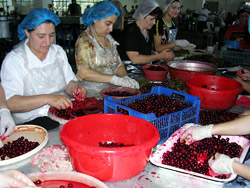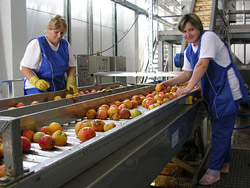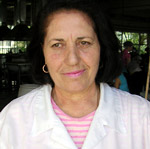
Made in Armenia
Hetq is beginning a new series of articles called Made in Armenia, aimed at presenting the activities of Armenian companies that export products to foreign markets and the problems and challenges they face.
Armenian products are recognized in the international market by a unique 13-digit bar code, which Armeniareceived in 1996 from the international organization GS1 (www.ean-int.org). GS1 developed a coding system which has allowed the international recognition of products and services in a unique and accurate manner. In other words, this is a common language, which importers and exporters can use to gain information about a given country's products. The first three digits of the bar code stand for the country, the following 6 refer to the company, the next 3 code for the product, while the final digit is a check and is determined by a specific algorithm based on the previous digits. The base code for products made in Armeniais 485. If any product bears a code beginning with these digits, it has been manufactured in Armenia. Armenian companies can obtain bar codes at the GS1 Armenia office (www.gs1am.org).
“I Don't Feel the State's Support in Any Way Today”
 The Noyan brand of juice, manufactured in Armenia, is currently exported to 25 countries around the world – France, Sweden, the United Arab Emirates, Belgium, Australia and others, but mainly Russia, America and Ukraine. The Noyan juice manufacturing plant has been operational since 1998. Everything has been done from scratch and today Noyan produces around 3 million liters of juice annually. The workload is greatest in the months during summer and fall. Nowadays, the plant is busy producing peach juice. Women seated in rows around tables were removing the stems and pits of sour cherries, in order to make jam. “I've been working here for the past three years, mainly during the fruit season. I make 2,000 drams a day and it's also good for me because I live nearby. We put labels on around 6,000 jars of jam or preserved fruit every day,” said Narine, a worker at the plant.
The Noyan brand of juice, manufactured in Armenia, is currently exported to 25 countries around the world – France, Sweden, the United Arab Emirates, Belgium, Australia and others, but mainly Russia, America and Ukraine. The Noyan juice manufacturing plant has been operational since 1998. Everything has been done from scratch and today Noyan produces around 3 million liters of juice annually. The workload is greatest in the months during summer and fall. Nowadays, the plant is busy producing peach juice. Women seated in rows around tables were removing the stems and pits of sour cherries, in order to make jam. “I've been working here for the past three years, mainly during the fruit season. I make 2,000 drams a day and it's also good for me because I live nearby. We put labels on around 6,000 jars of jam or preserved fruit every day,” said Narine, a worker at the plant.
The company currently exports more than it imports [fruits which do not grow in Armeniaare imported as raw material for the juices – L.N.]. 50 percent of the juice is consumed in the domestic market and the other 50 percent is exported. Vahe Ghazaryan, executive director of the Noyan manufacturing plant and founder of the family business, said that the weakening of the dollar against the dram greatly lowered the potential of the company to develop. “We were forced to raise the price of the exported products. I can give you an example to illustrate the situation. With our prices last year, our partners would have offered us a contract for 10 boxes, while today's prices have attracted a contract for 4 boxes. Of course, those 4 boxes are an improvement over last year's 3 boxes, but the difference is obvious.”
The executive director said that the appreciation of the dram was not the only issue. The company's cargo reaches its destination months later – it takes 80 days to get toAmericaand 40-50 days to reachMoscow. A similar amount of time is lost on the imports as well. Transport by air would cost more than the product itself.
In 2001, the company bought a new processing unit which concentrates the fruit – the fruit is processed, condensed and preserved in conditions making it possible to use in the winter as well as export. “We only keep 20 percent of our fruit concentrate for ourselves at our plant. We sell a very small portion of the remaining 80 percent to local ice-cream and candy manufacturers and export the rest,” said Vahe Ghazaryan. Many people are unaware of the fact that the reprocessed raw fruit made by Noyan is sold to the Russian and Ukrainian companies which produce Sandora , Jaffa and other well-known brands of fruit juice, which are then imported toArmenia. There are 40 brands of juice in the domestic market today.
 |
 |
By 2003, Noyan had already gained recognition in the American and Russian markets. “The consumers of Noyan in America are mainly ethnic Armenians and Russians from the former Soviet Union. In Russia, we organized tasting events and gave customers free samples in shops for months in order to secure our place in the market. Now, every tenth resident in Moscow knows that Noyan is a brand of fruit juice, that it is of good quality and expensive,” said the executive director. In his opinion, it is very difficult for Armenian producers to gain a footing in foreign markets and entails major expenses.
The Armenian businessman noted that it was difficult to compete not just in the foreign market, but in the domestic market as well. “The conditions for competition in the domestic market are not fair, many businessmen do not play by the rules. The customs and duty systems have many unwritten allowances for them. All that is obvious to us. We are 143 rd in the list of top taxpayers. But there are juice importers who have a market that is three times that of ours, but are not on the Tax Department list.” In 2003, Noyan had 40 percent of the juice market, today it holds 10-12 percent. The businessman felt thatArmenia lacked the preconditions for having a stable business. “We cannot call our work stable, we make new strategic decisions every month and develop a new pricing policy. We take loans but don't know what the dollar will be worth tomorrow or how to work accordingly,” said the executive director, “I don't feel the State's support in any of the issues regarding my business today.”
 |
 |
Today, Noyan produces 18 kinds of juice, 16 flavors of jam and 8 kinds of preserved vegetable. Asya Hayrapetyan, head of the preserves department, has been working in the company since day one. Her job is to supervise operations and to propose new flavors of preserves.
 “We don't sell any vegetable preserves in Armeniaat all, because our plant has been unable to keep up with our foreign orders. We sell our jams in Armeniaand people especially love the walnut, fig, mulberry, cherry and rose flavors,” Hayrapetyan said. “We are trying to bring in a new unit to increase our volume of vegetable preserve production, so that we can present some of our product to the domestic market as well. But now that the unit is here inArmenia the customs department is saying that is isn't a processing unit, it's something else. We face similar problems every day,” the businesswoman complained.
“We don't sell any vegetable preserves in Armeniaat all, because our plant has been unable to keep up with our foreign orders. We sell our jams in Armeniaand people especially love the walnut, fig, mulberry, cherry and rose flavors,” Hayrapetyan said. “We are trying to bring in a new unit to increase our volume of vegetable preserve production, so that we can present some of our product to the domestic market as well. But now that the unit is here inArmenia the customs department is saying that is isn't a processing unit, it's something else. We face similar problems every day,” the businesswoman complained.
300 people currently work at the plant, with the number dropping to 200 in the off-season. The average salary of the staff is 150,000 drams. The company bought 80 hectares of orchard last year. “Three years from now, 80 percent of our fruits will be from our own orchards. We came to this decision because we wanted to be able to supervise the whole process of fruit cultivation. We want to have ecologically pure products, for which we need to know how our fruits and vegetables are grown. This has not gained much attention inArmeniaso far, but ecologically pure products are double the price inEurope. Now we are preparing documents so that we can ask the corresponding European institutions to give us the status of a company producing ecologically pure products. This is a great advantage,” said Ghazaryan.
The raw material used in Noyan juice, jam and preserves is currently bought from Armenian villagers by the company. Peaches are grown in the villages of the Artashat, Armavir and Ararat provincial regions at 70 drams to the kilogram.
“I think that Armenian exporters need to present products in foreign markets that are of good quality and expensive. No Armenian producer can fill huge orders, we have to work for a narrow circle of consumers, but offering good quality at a high price. Producers working in Armeniashould not go for lots of money, but rather for great variety, if they want to continue living and working in this country,” said Vahe Ghazaryan, executive director of the Noyan juice plant.
 Videos
Videos Photos
Photos
Comments (1)
Write a comment